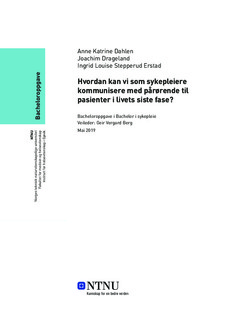| dc.contributor.advisor | Berg, Geir Vegard | |
| dc.contributor.author | Dahlen, Anne Katrine | |
| dc.contributor.author | Drageland, Joachim | |
| dc.contributor.author | Erstad, Ingrid Louise Stepperud | |
| dc.date.accessioned | 2019-09-06T14:04:18Z | |
| dc.date.available | 2019-09-06T14:04:18Z | |
| dc.date.issued | 2019 | |
| dc.identifier.uri | http://hdl.handle.net/11250/2613349 | |
| dc.description.abstract | Introduksjon: Kommunikasjon er en av sykepleierens mange ferdigheter og er essensielt for
å danne en relasjon til pårørende. Pårørende er en ressurs som er til støtte og hjelp, både for
pasienten og for oss sykepleiere.
Hensikt: Formålet med oppgaven er å finne vitenskapelig forskning, som kan gi oss som
sykepleiere kunnskap i kommunikasjon med pårørende. Vi ønsker å sette fokus på pårørende
som har sine nærmeste i siste livsfase.
Metode: Oppgaven er en litteraturstudie. Søk ble gjort i databasene Swemed+, Pubmed,
Cinahl og Medline Ovid i perioden februar-april 2019. Søkeord: Communication, nurse,
nurses, family, relatives, end-of-life, palliative care,
Resultat: Med utgangspunkt i funnene fra artiklene valgte vi å dele opp oppgaven i et
sykepleieperspektiv og et pårørendeperspektiv. Dette for å belyse problemstillingen vår fra
begge sider. Tiltaksplaner som LCP og ACP kan bidra til at kommunikasjonen med de
pårørende bedres. De pårørende kan være lite mottakelige for informasjon i en sårbar
situasjon og er også i behov for omsorg og oppmerksomhet.
Konklusjon: Kommunikasjon med pårørende bør inneholde aktiv lytting, åpne spørsmål, å
være bevisst både verbale og non-verbale uttrykksformer. Sykepleiere må også være bevisst
den ujevne maktbalansen. De pårørende ønsker å bli sett, lyttet til, respektert, og at vi
tilpasser oss deres familiedynamikk. Etablering av relasjon må ligge til grunn, men er
avhengig av at vi har tid nok til de pårørende. Ved å etablere relasjon kan de pårørende,
dersom de selv ønsker det, komme med bekymringer og tanker rundt det å miste en de er
glad i. | |
| dc.description.abstract | Introduction: Communication is one of the nurses many skills. It is essential to form a
relation with the next-of-kin. The family are a resource which is a support of, and help to,
both patients and us as nurses.
Purpose: The purpose of this bachelor is to find scientific research which can provide us as
nurses with knowledge in communication with the family. We want to focus on the next-ofkin of patients at the end of life.
Method: The Bachelor is a literature study. Searches were done in the following databases:
Swemed+, Pubmed, Cinahl and Medline Ovid in the period of February-April 2019.
Keywords: Communication, nurse, nurses, family, relatives, end-of-life, palliative care,
Result: Based on the findings in the articles we decided to look at the theme from two
perspectives, the nurse perspective and the next-of-kin perspective. This to illuminate the
issue from both sides. Useful tools such as LCP and ACP can contribute to a better
communication with the next-of-kin. Due to the emotional stress, relatives may not be
receptive for information. They are also in need of care and attention.
Conclusion: Communication with next-of-kin should contain active listening, open
questions, to be aware on the verbal and non-verbal expressions. Nurses need to be aware of
the uneven balance of power towards patients and their family. The next-of-kin wished to be
seen, listened to, respected and that we adjust to the family dynamics.
Establishing a relationship must be based on, and depends on having enough time for the
relatives. By establishing a relationship, the relatives, if they wish, may address their
concerns and thoughts about losing their loved ones. | |
| dc.language | nob | |
| dc.publisher | NTNU | |
| dc.title | Hvordan kan vi som sykepleiere kommunisere med pårørende til pasienter i livets siste fase? | |
| dc.type | Bachelor thesis | |
